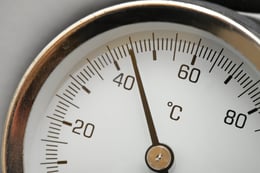Using temperature stand-offs can replace expensive high temperature pressure sensors.
When selecting a pressure transducer for monitoring high temperature liquids or gases, be sure to note the operating temperature range of the transducer. This specification is included under environmental data on 
The expense of a special high temperature pressure transducer can be avoided by using a temperature stand-off (short length of tubing) to isolate the transducer from the high temperature pressure media. The chart below shows various lengths and diameters of tubing for 303 stainless steel and brass that will limit the media temperature at the transducer to 0-200°F.
This chart assumes the ambient temperature around the transducer is 100°F and the major source of thermal input is via the connecting tubing. As an example, a 6 inch length of 1/4” O.D. 303 stainless steel tubing will protect a transducer from an 1100°F pressure media.
|
Length of Temperature Stand-Offs (Inches) |
|||
|
(ºF) Pressure Media Temperature |
303 Stainless Steel (.125 OD X .007 ID) |
303 Stainless Steel (.25 OD X .18 ID) |
Brass (.25 OD X .18 ID) |
| -400 | - | 4.50 | - |
| -300 | - | 4.25 | - |
| -200 | - | 3.75 | - |
| -100 | - | 3.00 | - |
| 0 | Not Required | Not Required | Not Required |
| 200 | Not Required | Not Required | Not Required |
| 400 | 3.00 | 3.50 | 7.00 |
| 600 | 3.75 | 4.50 | 8.75 |
| 800 | 4.30 | 5.20 | 10.00 |
| 1000 | 4.90 | 5.75 | - |
| 1200 | 5.25 | 6.10 | - |
| 1400 | 5.60 | 6.40 | - |
| 1600 | 5.85 | 6.80 | - |
CLICK HERE to learn how to select an intrinsically safe sensor.
